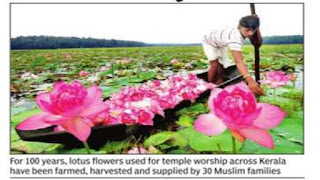Copyright@kamleshsujata1
By kamlesh Tripathi
By kamlesh Tripathi
In Lucknow many actors who take part in the annual
Ram-Leela are Muslims, where they play the lead role of Lord Ram, Hanuman &
Lakshman to name a few. In the TV serial of 1st Mahabharat the lead
role of Arjun was played by a Muslim actor. And it is so refreshing to read
that flowers for Kerala Deities are grown in Muslim farms.
And this indeed is the beauty of India where our society
has an undercurrent-life-connect with each other and resides in a bindass
environment.
FLOWERS FOR KERALA DEITIES BLOOM IN MUSLIM FARMS
TOI article
Malappuram:
Balanced on a battered canoe. Aslam gently plucks a
lotus that is just beginning to bloom and carefully places it in a pile.
He moves
through the vast expense of Valiyaparappur lake in Malappuram, collecting more
flowers, all meant for different temples in Kerala. Twenty-five-year old Aslam
belongs to one of the 30 Muslim families in the village of Thirunavaya, on the
banks of the Bharatapuzha river, who share a deep tie with Kerala’s Hindu
temples.
It is known
to very few devotees that the lotus blooms used in all major temples across the
state including Guruvayur Sri Krishna Temple, Sabarimala, Kodungalloor Bhagavathy
Temple, Paramekkavu Bhagavathi Temple, Thriprayar Sri Rama Temple and
Parshinikkaadavu Muthappan Temple are all farmed by these families.
“We have
been doing it for over a hundred years,” says Musthafa Chakkaliparambil, who
has 40-acre farm on the valiyaparappur lake. He supplies at least 7,000 lotuses
a day to temples in Guruvayur and Kodungallur.
On an
average, the village collects and distributes around 20,000 blooms every day. “Our
business has thrived only because of the blessings of the deities and the
revenue from temples,” says Abdul Rahman Karakkadan, who supplies flowers to
Guruvayur and Paramekkavu temple in Thrissur from his 85-acre farm. The flowers
are handed over to members of the Warrier community, who handle floral
decorations in temples.

No comments:
Post a Comment